
views
Talking to Your Teen
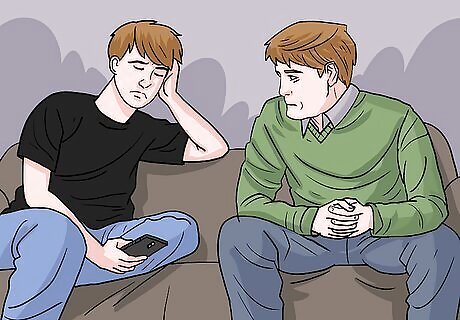
Talk about the situation. You may want to immediately punish your child, but do the harder thing and have a tough conversation. Sit down with your child and talk about the situation in a calm, gentle way. What happened? What led them to share photos of themselves or someone else? What made them curious to engage in this type of communication? Say, “This conversation will likely make us both uncomfortable, but it’s important to talk. Can you tell me what led to this? What were you hoping to get from this?” If your teen received a sext, ask them why someone might send a sexual image or text.

Avoid shaming your child. Despite what emotions you feel, be careful not to shame your child. Their actions do not define them, and casting harsh judgment may affect your teen’s self-esteem long-term. Talk about the dangers of sexting and the consequences of it without making personal judgments. Engage with curiosity. Instead of making accusations, ask questions and seek to understand your teen instead of blaming them. Use the opportunity to teach, not shame. For example, instead of saying, “I can’t believe how foolish you are!” say, “What led you to send that photo? What felt exciting about it?”

Acknowledge the psychological impacts. If a photo of your teen is shared, understand that your teen will likely feel humiliated, ashamed, or embarrassed. This experience can affect your child’s self-esteem and affect their mental health. Despite your own disapproval and disappointment at your teen’s behavior, recognize that this is likely a very traumatic experience for them. Give comfort and reassurance to your teen for the difficulty they are going through. Withhold your judgment and criticism and instead, be available for your child. You can deal with the after-effects soon enough. If a photo is shared with your teen, say, “How do you think that person feels?”
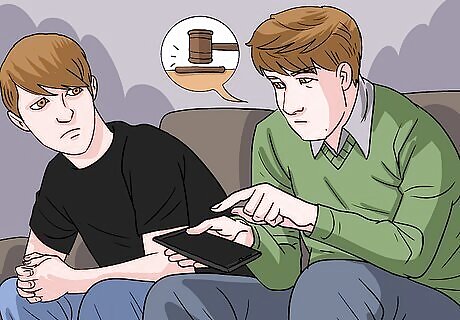
Discuss potential legal consequences. Any type of nude photograph, taken or shared with sexual intent, of a child under the age of 18 is illegal and considered child pornography. Any sharing of that photograph may be considered trafficked or distributed child pornography. So even if your teen sent a picture of themselves to someone else, that could be considered distributing child pornography. If the pictures on your teen's phone are of another teen, that can also be considered being in possession of child pornography. And if an adult has been sending and receiving pictures from your teen, this may constitute a crime. If you’re concerned about legal implications, consult with an attorney right away. Let your teen know that this is very serious, could result in criminal processing, and may affect the rest of their lives. Understand that the genders of the teens, in the context of sexting, is irrelevant. A teen sexting a picture of themselves to a teen of the same sex is no less legally or morally reprehensible than a teen sexting a picture of themselves to a teen of the opposite sex.

Explain long-term consequences. Teens are still developing skills and judgment. It’s often difficult for teens to grasp long-term consequences of impulsive decisions. While flirting and exploring sexuality may feel fun and pushing boundaries is normal, technology brings an added level of danger to these actions. Explain to your teen how these actions can affect them. For example, explain to your teen that their reputation may change if other people learn of or gossip about a sext. Legal problems can haunt a prospective college application or employment opportunity.
Taking Action
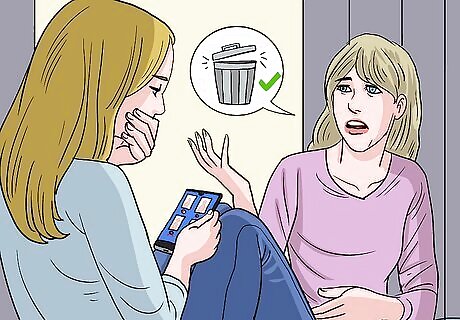
Delete any photos. If your child receives a nude photo, have them delete it right away. If your teen has nude photos of themselves, have them delete those, too. Your family will not want to risk having what is considered child pornography in the home or with any association to any members of the family.
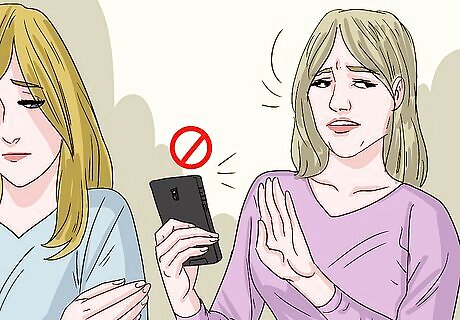
Avoid viewing the photos. If your child has sent photos, do not look at them. Not only will you not want to see them, but you will likely embarrass your teen greatly. If your child receives a photo, also do not look at it and do not share it. You may have the urge to say to the sender’s parents, “Look what your teen sent mine!” However, this could count as distributing child pornography. There is no circumstance where it is okay to share sexual material of a minor.

Keep your teen involved. While it’s important to handle these situations as a parent, keep your child informed. If you talk to other parents or to your teen’s school, let them know. It’s important for your teen to have a voice. This experience can affect your teen’s social life and emotional wellbeing. Staying involved can help them feel more empowered. Taking away your teen’s empowerment around sexuality can be harmful. As your teen grows into an adult, they should know that they have choices regarding their sexuality and to choose wisely. Have conversations with your child rather than relying on consequences to curb the behavior. Understanding what your teen is going through and what they are thinking can help more than doling out punishment.
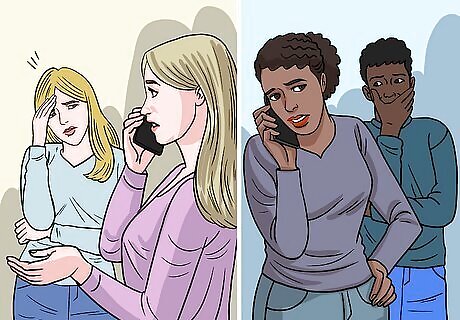
Unite with other parents. If other teens are involved, find ways to unite with other parents in how to handle the situation. This will clearly communicate to the teens that the situation is serious and that appropriate action is important. Having a united front will help all teens involved recognize that they are being treated in a fair way that is consistent with how other teens are being treated in the situation. Find out from your child what other teens are involved in the situation. Contact their parents and say, “Our teens have been sending and receiving sexual texts. Let’s unite and address this altogether.”

Consider informing the school. Carefully consider whether to get the school involved. You may involve the school if photos or texts are sent while on school property or during school hours. While it may be good to have outside intervention through the school and disciplinary action, notifying the school may also come with some difficult side-effects. Some schools have mandatory reporting requirements, which means that they are required to report any activity to law enforcement. This would mean that the incident would become a law enforcement case and potentially become a long, drawn-out battle. While some cases it is necessary to involve law enforcement, carefully consider whether your child’s situation requires intervention.
Handling the Aftermath

Talk about healthy sexuality. Teens shouldn’t solely get negative feedback for engaging sexual curiosity. Create a healthy atmosphere for your teen to talk about sex and feel comfortable doing so. While this might make you cringe, it’s important for both boys and girls to have positive messages about sexuality and choices. Tell your teen that they have choices about what they do with their body and who they share it with. Talk about when to say “No” and how to say “No.” As part of this discussion, help your teen learn to judge who they want to share their sexuality with versus who they shouldn't share that part of themselves with. This will help them make better decisions down the road.

Make an appointment with a therapist. If you’re concerned about the way your teen is expressing their sexuality or you feel like sexting has negatively impacted your teen’s wellbeing, talk to a therapist. Some teens develop symptoms of depression or anxiety after humiliation or difficult situations. If you’re concerned about your child’s wellbeing and emotional health, have them talk to a therapist. Ask your insurance provider, general practitioner, or local mental health clinic for a referral to a therapist. You can also ask friends and family for a recommendation.

Set limits. If you’re worried about your teens online or phone behavior, create some limits around social media and texting. You may consider purchasing a phone with no photo capabilities or no data or internet access. You may choose to ground your teen from using their phone or limit their use. Teens are most likely to receive inappropriate messages and photos late at night. Create a family rule of no electronics after a certain time each evening. Put family computers in public locations so that you can (casually) monitor activity.

Take care of yourself. You might feel jolted after realizing that your teen is exploring their sexuality. It can be difficult to realize that your teen has these feelings and wants to explore them. Think about how you want to cope with these thoughts and feelings. While some may choose to ignore or push away these thoughts, others may want to help their child work through this confusing time. Make sure you take care of yourself throughout this time. Take a daily walk, write in a journal, or take a bath. You can also begin a meditation practice to help you cope with stress. Consider seeing a therapist if you struggle to cope with the stress or have a difficult time interacting with your child after a sexting incident. You may also consider family therapy.




















Comments
0 comment